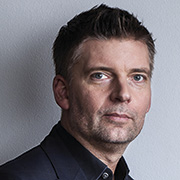Matthias Pintscher has structured his second Cello Concerto Un despertar (An awakening) for Alisa Weilerstein quite differently from his first: soft, lyrical, intimate and transparent.
Matthias Pintscher has written a new Cello Concerto, Un despertar for violoncello and orchestra, for Alisa Weilerstein. Pintscher has described a dark, warm singing of a male human voice as the starting point for the tonal quality of the work. Out of a “continuous slow, soft, tender and intimate song in the lower register of the cello” a quite characteristic virtuosity grows. “I wanted the desire which I had already taken as a theme in the Violin Concerto, the singing out of phrases, the pacing out of lines, the extending of horizons, that is to expand the horizontal and not the vertical.” One of the sources of inspiration for this sound is Alisa Weilerstein, “this unbelievably lyrical dark gold which she has within her playing”. Contrasting with his earlier Cello Concerto Reflections on Narcissus, which drives the instrumental sound into the highest heights, “insanely inflamed and fast and hysterical”, the composer has now created a piece “almost out of the sound of a shadow”. This basic situation of dark singing which explores the middle register and also the low register of the cello also has a decisive influence on the orchestral writing, which is characterized by lyricism, great tenderness and transparency.
The title is taken from a poem by Octavio Paz, “Un despertar” (An awakening), and the atmosphere of this text from 1966 determines its basic situation: “How this old man stands at the window and looks out into his snow-covered life, in the silence of the fine snow, analysing his whole life, that’s an emotional state which inspired me”, says Matthias Pintscher, “a state of awakening and self-knowledge”. Here, too, the composer continues topics from his earlier works, such as the ensemble piece bereshit: the awakening and the beginning of gradual recognition, the vulnerability in this situation, “where, with experience and time, one recognizes more, senses memories which then form images and messages. Even that is a theme: to progress from a vague contour into clearer contours.” The one-movement composition is divided into caesuras by two large contrasting blocks, “but it always returns to this original condition of dark singing, as if the cello is used like a human voice”. Ultimately, this new concert work for a low stringed instrument, links aesthetic approaches which also prevailed in en sourdine and finally in Mar’eh for violin as well as in tenebrae for scordatura viola and ensemble. These circle around linearity, the utopia of singing, and also investigate the subdued world of shadows.
Marie Luise Maintz
(from: [t]akte 2/2015)



